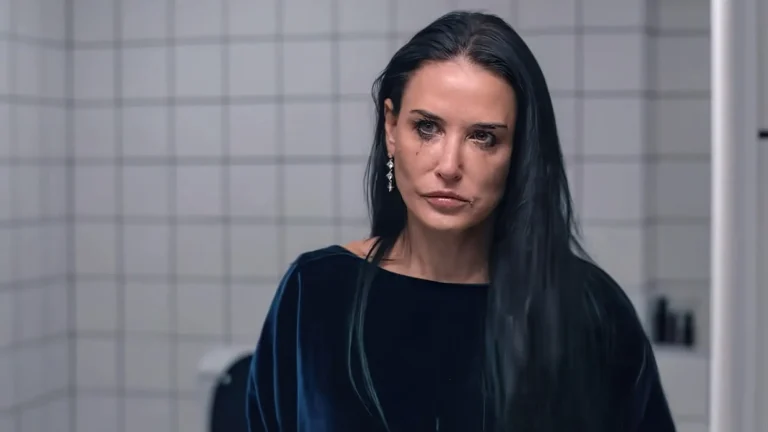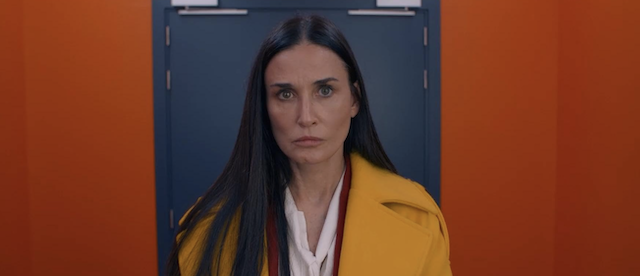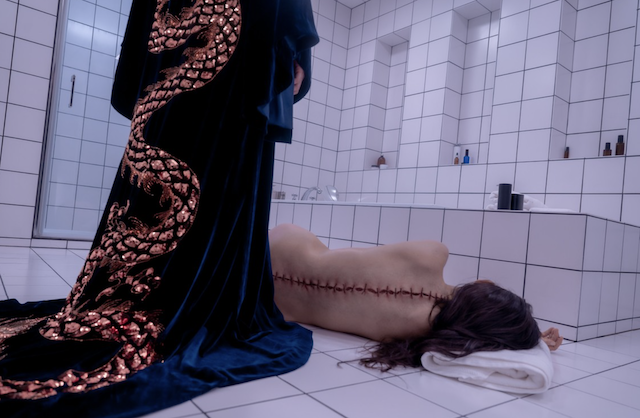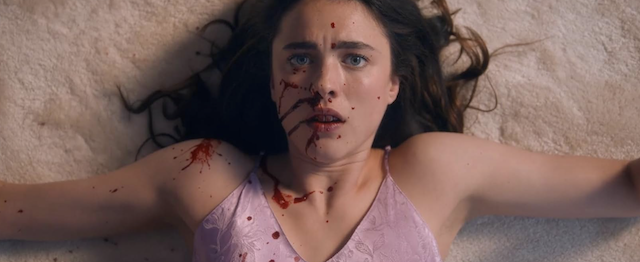
@Courtesy of MUBI

Press Conference With Director Coralie Fargeat
Q: This is both an entertaining horror movie and a cautionary tale. What have been the most surprising reactions that you’ve heard to the film?
Coralie Fargeat: There are people, especially women, who usually are not into horror films. They told me: “Oh my God, that’s not usually the type of movie I’m watching, but I totally loved it and I felt seen”. I’m receiving many texts about women saying: “It changed my life, I’m more gentle toward myself now.” Just yesterday I read a comment like: “Coralie, you have given us a revolution”. That was to me the best message I could definitely receive from the audience.
Q: How do you think your film enhances the aesthetic frontiers of body horror?
Coralie Fargeat: My language in filmmaking is not with words, it’s through visual and through sound. Building a visceral experience for the audience using cinematography together with sound design and what you’re going to see on screen with prosthetics was really the core of The Substance. I love challenges, creating scenes that you’ve not seen before, for instance the birth sequence when Sue is born from Elizabeth. It’s the first scene that I wrote. I didn’t even know who my character would be. It’s the first one that really came to my mind. I think it has all the core DNA of the movie as a true visceral experience with no words, making you feel what the characters are going to feel. It’s the association of three elements: the visuals with the location that reflects what the characters have in their mind, the madness that goes more and more and that gives frames that are crazier and crazier, and of course the flesh that I’m going to film in very macro shots.
Q: What specific challenges did the film’s practical effects pose? What prosthetics and makeup effects were the hardest to achieve and/or hardest to figure out on set?
Coralie Fargeat: So many. When you start making a film, the strong choices that you make about how you’re going to make your movie is what’s going to be the core of your film. I knew in my guts that for this film, which is about women’s bodies and flesh and bone, I wanted to see everything for real as much as possible. The number of prosthetics that are used in the movie is huge. That’s what led us to have an extremely long shooting, more than 100 days.
Once we had done the shooting with the actresses, we shot an extra 15 days in what we called the lab, which was a very reduced unit of me and five people to shoot all the prosthetic work, all the close-ups, all the things which are the core of the filmmaking but need very few people. That’s a very strong element that is at the core of the film, that you can feel it’s really a crew that enjoyed so much giving life to those elements. They cared so much about finding the right balance that I needed for the transformation process, which is not just about aging, but about deforming, a real metamorphosis. For each transformation of the character, we had maybe 10 different techniques, depending on the shots that I was going to do.

@Courtesy of MUBI
Q:. Did you write the screenplay with any of these actors in mind or did you find them through their casting process?
Coralie Fargeat: When I write a script, I usually have an image in my mind because I’m a very visual person. I write what I see and what I want to film in the end. There is always an image and some idea that guides me. But there is your mind, and then there is a reality where your movie is going to become real. Most of the time it is not the idea you had to start with that’s going to happen. I knew, to be honest, that the casting process was going to be the toughest challenge of the film because basically, I wanted an actress who would be iconic, who would symbolize what the movie is about.
I knew that it would mean basically confronting an actress to her worst phobia. I had some rejections, some actresses turned down. At some point, the name of Demi arrived in the conversation. I said: “It’s a great idea, but let’s not waste time with that because she will never want to do this. Let’s send the script, but let’s not wait for too long”. She immediately responded in a very strong way to the script. From then we met, discussed a lot about the specificities of the movie because I really wanted her to know exactly what she would step in. We also discussed the level of nudity that the movie requested because it’s a real way to tell what the movie is about, each shot has a meaning.
It was important for me that she understood and felt at ease with that because it was crystal clear on the script that the movie was a vision. It was really something super specific that I had in my mind, that I needed to express in a certain way. It was important to feel that Demi would be ready to really team with me to create this story and this vision. I also read her autobiography, I discovered something very different from the image I had of her. Someone who took many risks in her life. I discovered someone who really rocks. She does have the level of mindset and risk-taking that the movie needed.
Q: Were there any past films that you wanted to pay homage to?
Coralie Fargeat : There were many, I must say. Many of the movies that you can see as an homage or related inspiration are movies that were truly important for me in the way I built my filmmaking. As I was saying, I don’t write my scripts with words but with visual language, with rhythm, with something crazy that escalates little by little. All the movies that I grew up with and I strongly reacted to were the movies that were taking me into this journey where I could feel very, very strong emotion entering the imagination and the creativity of someone who was letting me see his inside in some way. I think all those things truly build the way I build my eyes and my vision. Specific movies like The Fly or Requiem for a Dream or The Thing from John Carpenter, Scanners, all have had such a strong impact on the young girl I was. I’m so happy now to take them out of my guts and put them on the table for other people.
Q: Do you think that Hollywood still embraces a culture of forever youth, if you will?
Coralie Fargeat: The whole world still embraces that culture. It’s everywhere around us. I think it’s a dream that we all have in our heads somewhere. That’s why I was interested in choosing that specific symbolic location to tell the story. To me, it’s not really about Hollywood. It’s the whole world that has been built on a certain pattern that has shaped women through the lens of men who are looking at them and saying: “This we like, this we don’t like, this we think is sexy, this we think is ugly”. It still has a very high impact on how we see ourselves and what the expectations are. It’s a systemic thing, it’s so hard to get out of this. Even if you know that you shouldn’t be influenced by that or you shouldn’t be worrying about that, you still are because on an individual level, you can’t fight everything that is around and that enters your brain every minute when you’re outside.
Q: Did you use this movie as the best way to challenge society and to show how women are treated? Was that a conscious choice?
Coralie Fargeat: There is this sentence that I wrote in an article that I love so much, which was saying: “Being a woman is body horror”. I think it’s so true. I really wanted to express what the relationship with our bodies is, how our body is something that is not neutral in the public space and that totally defines the whole way we interact with the world. How we constantly have to worry about it, how we constantly have to deal with the gazes, how our bodies are chopped by the people who look at us.
This is, to me, the true violence. This is the hardest violence because it’s a violence that we have within ourselves and it’s so hard to free ourselves from this. The idea to use the symbolic violence with body horror and all the blood and all the distortion of the flesh was a very accurate way to portray for real the violence that I feel inside and felt all my life regarding all those issues. To me, it was important to use the excess language to go very far, to be excessive, to be at the level of what I feel regarding those issues, which to me are massive and still almost taboo and not talked about enough in our world.

@Courtesy of MUBI
Q: Was there a moment during filming where you knew that you had created something special?
Coralie Fargeat: When I decided to write The Substance, it was something that was so important to me that instinctively resonated so much with how I feel as a human being in the world regarding those matters. I knew that if I succeeded in giving life to this movie, which was going to be so hard and so challenging, I knew it could be something important because I was doing it with such sincerity, with my experience, my analysis of the world regarding those issues. I knew that if that energy managed to go through to reach the audience, I felt that something could happen. I was so happy when I saw that the audience was embracing the movie. It’s something that takes time to digest, to analyze, to think about, to create conversations.
Q: Do you see the sign of the success of The Substance as being a sign that people are craving different and creative storytelling in theaters again?
Coralie Fargeat: Yes. I think this movie was a great step of telling: “Okay, who I am as a person, as a woman with my soul, is worth communicating to the world”. That was a huge step that I allowed myself to do with this movie, Feeling the theatrical experience, it was to me the core of the creation of the movie: people going in theaters, having the collective experience, sharing with the audience everything that was going to happen, sound-wise, visual-wise, and for them to have a ride. I think that’s what made me love cinema so much and made me want to do that. Hearing people being happy to see new ways of making films, new ways of telling stories, because I did everything not following the rules. I did them following the rules I created for the movie. I was so happy to see that people are going for the ride because I think that’s what we need: new representations, new imaginations, new creativity to refresh our collective mind.
If you like the interview, share your thoughts below!
Check out more Adriano’s articles.
Here’s the trailer of The Substance

